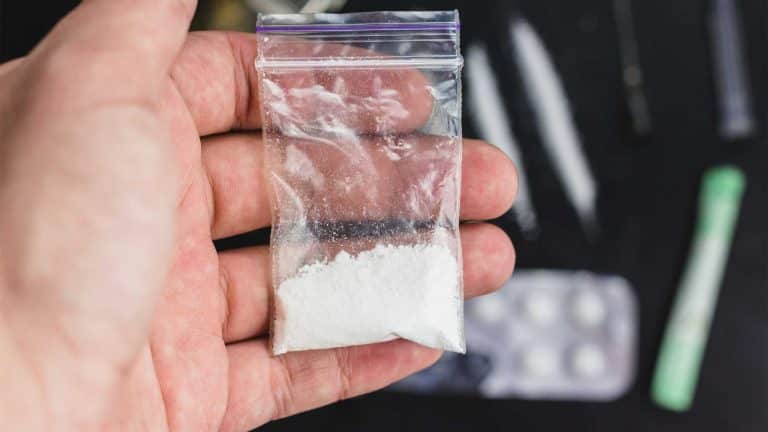Snorting Ketamine | Effects & Dangers Of Ketamine Abuse

Ketamine hydrochloride, produced in both liquid and powder form, is a Schedule III controlled substance with an unusually wide range of effects on the human body and mind. These effects change dramatically depending on what size doses of ketamine are taken.
Ketamine may be used as a sedative, a dissociative anesthetic, a psychedelic hallucinogen, an anti-depressant, a date rape drug, or a mind-altering party drug that makes frequent appearances in music and youth events in the United States.
When taken recreationally, ketamine is most commonly snorted, though this method of ingestion comes with significant health risks.
What Is Ketamine Used For?
Ketamine is the most common drug used to sedate animals prior to surgery in veterinary clinics.
It’s also used in human surgery and dental care to induce numbness, sedation, and amnesia and is considered a low-risk anesthetic as it (when properly dosed) does not have side effects that suppress breathing or blood pressure.
Ketamine has also shown promise when used as a therapy for treatment-resistant depression and other severe mental health conditions including post-traumatic stress disorder.
The use of ketamine for non-medically approved purposes is considered substance abuse and is illegal.
Why Is Ketamine Snorted?
When used as an illicit recreational drug, Ketamine (Vitamin K, Super K, Special K, Ket, and Kit Kat) can be taken in a few different ways:
- oral ingestion
- injection
- snorting
Of these three, snorting is favored because it is faster and delivers a more potent high than oral ingestion and does not require a needle or syringe.
The drug is typically divided into a line, called a bump, and then inhaled using a paper or plastic straw. From there, the drug is quickly absorbed through the fine membranes and blood vessels of the nasal cavities and passed on to the brain. Effects can be felt in as little as five to ten minutes.
Effects Of Snorting Ketamine
In general, a ketamine high will begin with dream-like feelings of euphoria and pleasure. You may have trouble speaking or moving, experience visual or auditory distortions, and it’s common for blood pressure and breathing to slow down.
Because ketamine is a dissociative anesthetic, ketamine highs usually bring feelings of detachment. You may feel separated from your body and more or less connected with those around you or the rest of reality. Floating sensations, confusion, and hallucinations are common.
At higher doses, this dissociation can lead to what is known as a K-Hole, an intense disconnect between you and the outside world (including your body) that leaves you immobile and unable to speak. K-Holes often feature severe flashbacks, hallucinations, and other symptoms of psychosis.
The sensation has been described as somewhere between severe intoxication and a coma.
Health Risks Of Snorting Ketamine
While snorting is generally considered a less damaging method of substance use than injection, it is still extremely damaging to the body in the long term.
Snorting drugs, including ketamine, causes negative health effects including:
- damage to the nasal tissues
- loss of smell
- nosebleeds
- long-term runny nose
- lung irritation
- hoarse voice
- difficulty breathing
- problems swallowing
Ketamine Overdose
If too much of the drug is taken an overdose can occur. And because snorting introduces a large dose of the drug to the body very quickly, this method of ingestion increases the risk of adverse reactions, including overdoses, relative to oral ingestion.
High doses of ketamine may cause overdose symptoms including:
- confusion
- paralysis
- seizures
- nausea
- vomiting
- psychosis
- slow, shallow breathing
- irregular heart rate
- memory loss
- unconsciousness
- coma
While ketamine overdoses are not generally as deadly as overdoses resulting from the use of hard drugs, they can still be harmful and even fatal, especially if the drug is mixed with other substances like alcohol.
Ketamine Addiction Treatment
Addiction treatment programs are available to help you or your loved one overcome ketamine withdrawal symptoms and other symptoms of addiction.
These personalized inpatient or outpatient programs may also include treatment for co-occurring mental health disorders that contribute to harmful or self-destructive patterns of drug abuse.
To learn more, contact an Ark Behavioral Health specialist today.
Written by Ark Behavioral Health Editorial Team
©2024 Ark National Holdings, LLC. | All Rights Reserved.
This page does not provide medical advice.
Drug Enforcement Administration (DEA) - Drug Fact Sheet: Ketamine
National Institute on Drug Abuse (NIDA) - Ketamine
NCBI Bookshelf - Ketamine - StatPearls

Questions About Treatment?
Ark Behavioral Health offers 100% confidential substance abuse assessment and treatment placement tailored to your individual needs. Achieve long-term recovery.
100% confidential. We respect your privacy.
Prefer Texting?
Our friendly support team is here to chat 24/7. Opt out any time.







 Learn More
Learn More








